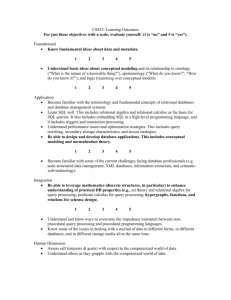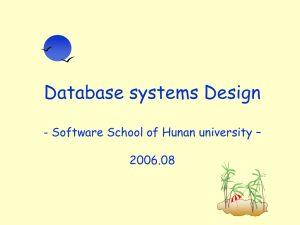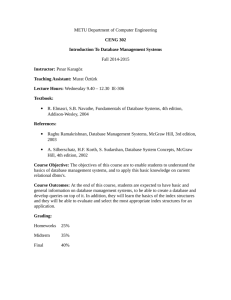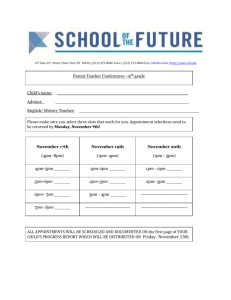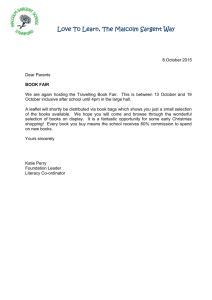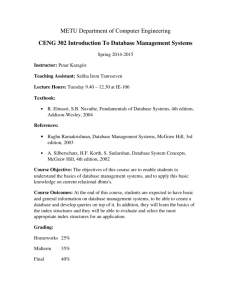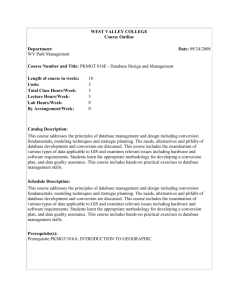Learning Guide - Ironbark (xtelco)
advertisement
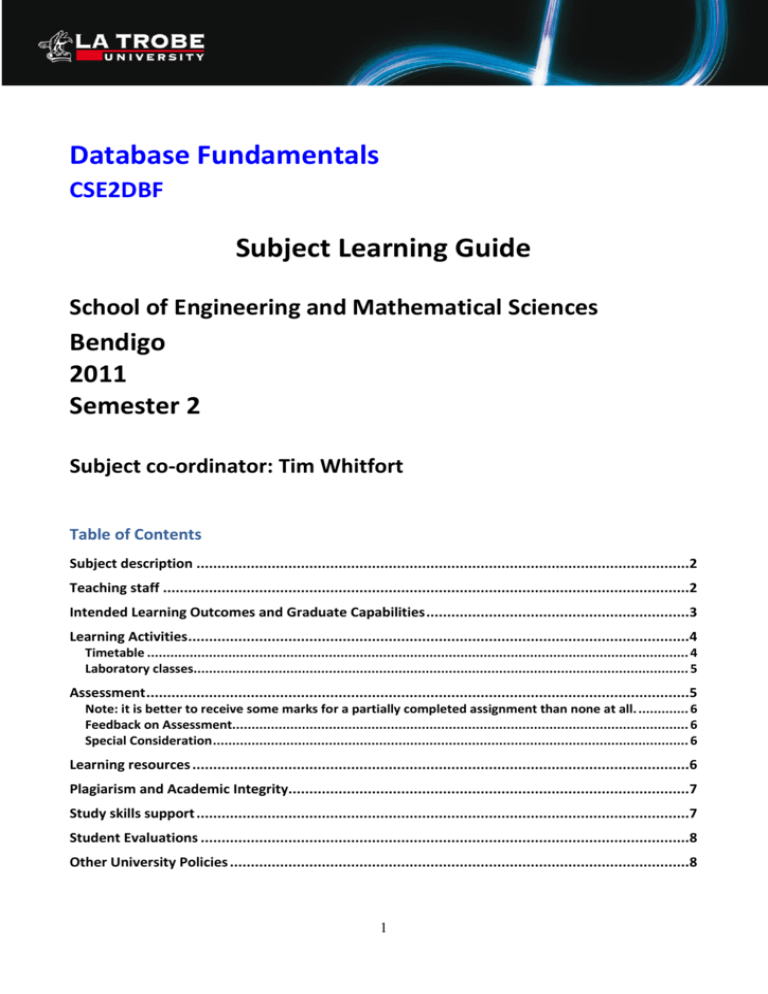
Database Fundamentals CSE2DBF Subject Learning Guide School of Engineering and Mathematical Sciences Bendigo 2011 Semester 2 Subject co-ordinator: Tim Whitfort Table of Contents Subject description ......................................................................................................................2 Teaching staff ..............................................................................................................................2 Intended Learning Outcomes and Graduate Capabilities ...............................................................3 Learning Activities ........................................................................................................................4 Timetable ............................................................................................................................................ 4 Laboratory classes................................................................................................................................ 5 Assessment ..................................................................................................................................5 Note: it is better to receive some marks for a partially completed assignment than none at all. ............. 6 Feedback on Assessment...................................................................................................................... 6 Special Consideration ........................................................................................................................... 6 Learning resources .......................................................................................................................6 Plagiarism and Academic Integrity................................................................................................7 Study skills support ......................................................................................................................7 Student Evaluations .....................................................................................................................8 Other University Policies ..............................................................................................................8 1 Subject description This subject starts with an overview of the architecture and management of database systems, and a discussion of different existing database models. The main focus includes relational database analysis, design, and implementation. This unit prepares students for units such as the final year major project which requires an understanding of database design and implementation. The students learn: relational algebra as the formal foundation of relational databases; relational conceptual design using an entity-relationship diagram; relational logical database design; foundation of normalization; security and integrity; and SQL implementation of relational database queries. In this unit, students are required to design a database application that meets the needs of a system requirement specification, and to implement the system using a commercial standard database system such as ORACLE or POSTGRESQL. In addition, a selection of advanced topics in databases will be introduced and discussed. Teaching staff Tim Whitfort Office Location Business 1.19 Email t.whitfort@latrobe.edu.au Phone 5444 7312 For issues concerning this subject, you should first approach the subject coordinator. More general matters associated with the course should be referred to the coordinator (Kerry Qualtrough, AS2 3.01, 5444 7805, k.qualtrough@latrobe.edu.au). If you are not able to resolve your issue through these channels, you should refer them to the Deputy Head of the Department of Computer Science and Computer Engineering (Mary Martin, B1.12, 5444 7273, m.martin@latrobe.edu.au), or in the final instance to the Head of the School of Engineering and Mathematical Sciences. When contacting staff, use your La Trobe student email account; this will also be used to contact you (as per University policy). 2 Intended Learning Outcomes and Graduate Capabilities Intended Learning Outcome 1. Apply a database modelling technique using an ER and EER diagram, and use a transformation process to change these to a relational database design. 2. Identify the appropriate normalization techniques for database design. 3. Implement a database system using SQL and apply the relevant knowledge in database management and administration. 4. Define the underlying model of relational database operations using relational algebra. 5. Identify the possible risks and ethical and social considerations relevant to a designed system. Teaching and Learning Activity Assignment & Exam. Graduate Capabilities Assignment & Exam. Critical thinking, discipline-specific knowledge and skills. Assignments & Exam. Critical thinking, creative problem-solving, discipline-specific knowledge and skills. Writing, inquiry/research, critical thinking, creative problem-solving, disciplinespecific knowledge and skills. Quantitative literacy. Ethical awareness and professional conduct. 3 Learning Activities Timetable Class time: 2 hours of lectures and 2 hours of tutorials per week. Lectures Class Time Lecture 1 Monday 10:05-10:55am Lecture 2 Wednesday 9:05-9:55am Room B130 B230 Tutorials Class Tut/Lab Tut/Lab Time Monday 11:05-11:55am Wednesday 10:05-10:55am Room B205/B111 B215/B111 Schedule Week # 1 Week Commencing 25/7 2 3 4 1/8 8/8 15/8 5 6 22/8 29/8 7 5/9 8 9 12/9 19/9 Topics References Introduction to Database, Database System Architecture & Introduction to Relational Database. Relational Algebra; Introduction to SQL. SQL Aggregate Functions; Joins & Subqueries. Inline Subqueries, Union & Outer/Inner Joins; Modifying Table Data in SQL. SQL Data Definition; Complex SQL Queries. Report Generation; Entity-Relationship Data Modeling. Database Integrity; Mapping E-R Diagrams into Relations. Normalisation Database Administration & Data Dictionary; Database Security. Hoffer chps 1 & 2 Hoffer chps 6 & 7 Hoffer chps 6 & 7 Hoffer chps 6 & 7 Hoffer chps 6 & 7 Hoffer chps 2 Hoffer chps 3 & 4 Hoffer chp 4 Hoffer chp 11 Assignment 1 due 4pm Fri 23-Sep-11 10 11 12 13 26/9 3/10 10/10 17/10 24/10 Lecture Break Transaction Processing; Backup & Recovery. Concurrency Control; Optimisation Distributed DBMS; Data Warehouse Embedded SQL; Revision & Exam Assignment 2 due 4pm Fri 28-Oct-11 4 Hoffer chp 11 Hoffer chp 11 Hoffer chps 9 & 12 Tutorials commence in the first week of semester following the second lecture. Tutorial classes have a maximum of 20 students per class. Please put your name down on the tutorial list located on the lecturer’s door (available in the week before week 1). Estimated time commitment for the subject including class time: 10 hours per week averaged over the semester, lecture break and exam period. Laboratory classes Tutorials exercises are available on the web. Food and drink is not permitted in Lab rooms. Assessment Intended learning outcomes 1-3 3 1-2 Assessment % of final mark 60% 20% 20% Exam 3 hrs Assignment 1 Assignment 2 Submission Date See the exam timetable 4pm Fri 23-Sep-11 4pm Fri 28-Oct-11 Pass Requirements To pass the subject students must achieve the following: A minimum of 50% overall and A minimum of 50% on the exam and A minimum of 50% on the assignment work Late Assignments Assignments must be handed in by 4pm on the due date or incur the following late penalties. Days Late 1-3 4-5 6-7 7+ Penalty 5% 20% 40% 100%. Not Accepted Clarification of Days and Times Between 4pm Friday and 4pm Monday Between 4pm Monday and 4pm Wednesday Between 4pm Wednesday and 4pm Friday After 4pm on the Friday after it is due When calculating the final mark for a late assignment, the late penalty is calculated based on the maximum possible mark for the assignment. For example if a student hands the assignment in at 1pm Tuesday (4 days late) and they achieve a raw mark of 75% on the assignment, then a late penalty of 20% is applied and they get a final mark of 55% (75% - 20%) for the assignment. 5 Extensions Extensions will only be given under exceptional circumstances and will only be granted if notification is received in writing. Some reasons for not allowing extensions are: o Extensions are unfair to those who have worked hard to deliver assignments on time. o The lecturer cannot cover the solution until the last assignment has been handed in. o A late assignment usually leads to late assignments in other subjects, leading to deterioration in the quality of work submitted. o Deadlines exist in the real working environment. Note: it is better to receive some marks for a partially completed assignment than none at all. Feedback on Assessment Assignment work will be marked and returned before the next piece of assessment is due. Special Consideration The School of Engineering and Mathematical Sciences (SEMS) applies the standard University policies and procedures for special consideration, if you believe your performance in assessment has been adversely affected by illness or other serious circumstances. This includes the requirement that applications are lodged (on the correct form, to the Student Centre) in a timely manner and that they are complete, accompanied by supporting documentation. Each application is considered (special consideration) by the subject coordinator; the granting of further assessment (special exam or special assessment) is not automatic upon receipt of an application. To avail yourself of any special exam offered, you must make yourself available during the official period for these exams. Learning resources Text Book Jeffrey Hoffer, Mary Prescott & Heikki Toppi (2011) Modern Database Management, 10th ed. Upper Saddle River, N.J.: Prentice Hall References Some useful references for the subject are: Coronel, C., Morris, S. & Rob P. (2011) Database Systems: Design, Implementation and Management. 9th ed. Boston USA: Course Technology. Churcher C. (2008) Beginning SQL Queries: From Novice to Professional. Berkeley, CA : Apress. Beaulieu, A. (2009) Learning SQL, 2nd ed. Sebastopol, CA: O'Reilly. See References on the subject web pages for other references on Java and software construction. 6 Referencing and Paraphrasing guide: http://www.lib.latrobe.edu.au/help/STE-Referencing-Guide-2010.pdf Subject Web Pages Class lecture notes, assignments, tutorial exercises (and more) will be made available on the web. The notes on the web should not be viewed as the complete content of the subject. During lectures, topics outlined in the notes will be expanded on with explanations, examples, diagrams, discussion etc. The Web pages for the subject are located at: http://ironbark.bendigo.latrobe.edu.au/subjects/DB/ Prerequisites Object-Oriented Programming Fundamentals (CSE1OOF) and IT Fundamentals (CSE1ITF) Plagiarism and Academic Integrity Academic honesty is a fundamental principle in teaching, learning, research and scholarship. La Trobe University requires its academic staff and students to observe the highest ethical standards in all aspects of academic work and it demonstrates its commitment to these values by awarding due credit for honestly conducted scholarly work, and by penalising academic misconduct and all forms of cheating. You are expected to be aware of, and comply with, the University’s standards for academic integrity. Your responsibilities and the penalties for academic misconduct are explained at: http://www.latrobe.edu.au/learning/integrity.html All assessable tutorial and assignment work should be substantially your own. Working closely with someone else on an assignment is cheating. Plagiarism of assignment work will be reported and may result in a zero mark being awarded to all involved persons. Each assignment must be accompanied by a signed STATEMENT OF AUTHORSHIP. Use the individual or group statement of authorship as specified for the assignment. Study skills support Other resources to help with study skills: FSTE First Year Survival Guide Library Student Learning 7 Student Evaluations All SEMS subjects conduct regular student feedback surveys. Summary of Student Feedback Survey responses may be found at: http://www.latrobe.edu.au/scitecheng/student-feedback The subject report (including responses to the student feedback) for 2010 may be found at Other University Policies SEMS subjects adhere to other university policies not mentioned specifically above, including, but not limited to, the policy on supplementary assessment. You can consult them at: http://www.latrobe.edu.au/policy SEMS provides computers and internet access solely for use in completing your subject requirements. The use of this facility is controlled by the School internet policy for students: 8

